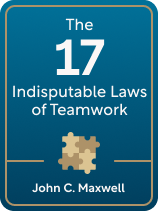

This article is an excerpt from the Shortform book guide to "The 17 Indisputable Laws of Teamwork" by John C. Maxwell. Shortform has the world's best summaries and analyses of books you should be reading.
Like this article? Sign up for a free trial here.
What are common barriers to teamwork? Why do people avoid teams, even when teams are more effective than working alone?
Barriers to teamwork include ego, insecurity about performing, underestimation of task difficulty, and overall personality. If you can understand where these come from, you can begin to understand how to overcome them.
Discover why people may resist working in teams and how you can encourage teamwork.
Why Teamwork Matters
If you want to achieve great things, you need to build a team. No one can accomplish anything significant by themselves and that all remarkable achievements require team effort. This is because teams have more energy, resources, knowledge, and perspectives than an individual acting alone. They can leverage their collective strengths to overcome obstacles and innovate solutions. In other words, no matter what you aspire to do, you’ll accomplish more by having a team, whether that team is your family, church group, sports team, or colleagues. So why do people so often avoid working in teams? What are the most common barriers to teamwork?
(Shortform note: Some experts argue that teams aren’t always more effective than individuals—it depends on the nature and complexity of the task. For simple tasks, individual effort often prevails, as group work can slow down the process. However, for more complex tasks, groups have an advantage over individuals because they can combine different skills, perspectives, and ideas to find better solutions more quickly. Ambitious goals will likely require both complex and simple tasks, so it may be more valuable to be flexible and alternate between individual and group work based on the task at hand.)
Common Barriers to Teamwork
Many people dislike working in teams, and if you struggle with teamwork, you should try to identify the reason so you can address it, overcome it, and reap the benefits of teams. There are several common reasons people are reluctant to work in teams:
- Ego: You have a strong sense of self-reliance and want to be able to handle everything without relying on others.
- Insecurity: You lack confidence and worry your team members will outperform you.
- Underestimation: You underrate how challenging your goals are and think you can easily achieve them by yourself.
- Personality: You feel more comfortable working alone.
| Overcoming the Barriers to Teamwork According to one study, less than 50% of workers enjoy working in a team, which means there’s a good chance you’re resistant to teamwork. While this article doesn’t give detailed suggestions on how to overcome the four most common reasons for resisting teamwork, other experts offer advice you can consider. In Ego Is the Enemy, Ryan Holiday defines ego as a sense of superiority that causes you to view others as either a threat or someone who’s below you. To overcome a sense of ego, focus on doing something rather than being something. For instance, instead of trying to be seen as a self-reliant person, focus on the goals you want to achieve. When you do, you’ll likely realize that working with a team can help you reach them more quickly and easily. If you struggle with insecurity, practice self-compassion by being kinder to yourself when you make mistakes and focusing on accepting your true self rather than comparing yourself to other team members. In Barking Up the Wrong Tree, Eric Barker writes that self-compassion is better than confidence because it improves your performance and boosts your mood. In The 10X Rule, Grant Cardone writes that many people underestimate the effort and resources needed to reach their goal. To prevent this underestimation, multiply your expectations by 10. By doing so, you’ll likely realize the importance of having other people to provide support and resources. Finally, if you consider yourself more of an independent worker, some experts recommend you at least give working in a team a try. In The 7 Habits of Highly Effective People, Stephen R. Covey writes that collaboration is contagious. The more you work with others who share ideas openly, the more you may find it easier to collaborate and reap the benefits of teamwork. |

———End of Preview———
Like what you just read? Read the rest of the world's best book summary and analysis of John C. Maxwell's "The 17 Indisputable Laws of Teamwork" at Shortform.
Here's what you'll find in our full The 17 Indisputable Laws of Teamwork summary:
- Why building a high-performing team requires hard work
- Why no one can accomplish anything significant by themselves
- How to recruit and organize the right people to achieve your goal







I don’t have an ego
I care to work alone
I am not insecure
Team work means relying on others and some don’t pull there weight leaving a few team members doing the job .
As my job is as an instructor there is no team to conduct that job .